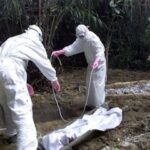The United Nations Mission for Ebola Emergency Response (UNMEER) has declared that Ebola is not an airborne disease.
This declaration follows the recent media controversy on the issue.
A statement issued in Accra by World Health Organization (WHO) and copied to the Ghana News Agency, on Friday, by Christy Feig, WHO Communications Officer said:“ at this point in time we have no evidence and do not anticipate that the Ebola virus is mutating to become airborne”.
“However, there are real risks and concerns with this outbreak: every day more people are becoming infected and more are dying because they cannot get the care they need,” she said.
It said countries needed to focus their energies to swiftly address the real needs and gaps in communities affected by the disease.
The statement said: “The Ebola virus only spreads through contact with bodily fluids. The WHO monitors the virus closely.
“Viruses do mutate but it is a complex process that takes time. Right now, as advised by WHO, the safest thing anyone can do is avoid direct contact with bodily fluids of people who have Ebola, and with surfaces and materials such as bedding and clothing contaminated with fluids.”
Ebola hemorrhagic fever (Ebola HF) is one of the numerous Viral Hemorrhagic Fevers. It is a severe, often-fatal disease in humans and nonhuman primates (such as monkeys, gorillas, and chimpanzees).1
Fever, body aches, and sore throat as that of malaria and typhoid, are seen at the initial stages of Ebola infection.
As the infection progresses, patients experience severe internal bleeding with blood leaking out of their mouth, eyes, ears and the vessels.
From the time of infection, the incubation period is two to 21 days.
So far, Guinea, Sierra-Leone, Liberia, the Democratic Republic of Congo and Nigeria are battling the recent outbreak from March, though a few other countries have reported isolated cases.
The WHO, according to a BBC report, says more than 3,000 people have died of Ebola in West Africa.
It is the world’s most deadly outbreak of the virus and threatens to collapse the economy of the affected countries, experts say.
The first Ebola virus species was discovered in 1976 in what is now the Democratic Republic of the Congo, near the Ebola River. Since then, outbreaks have appeared sporadically.
Source: GhanaWeb
















